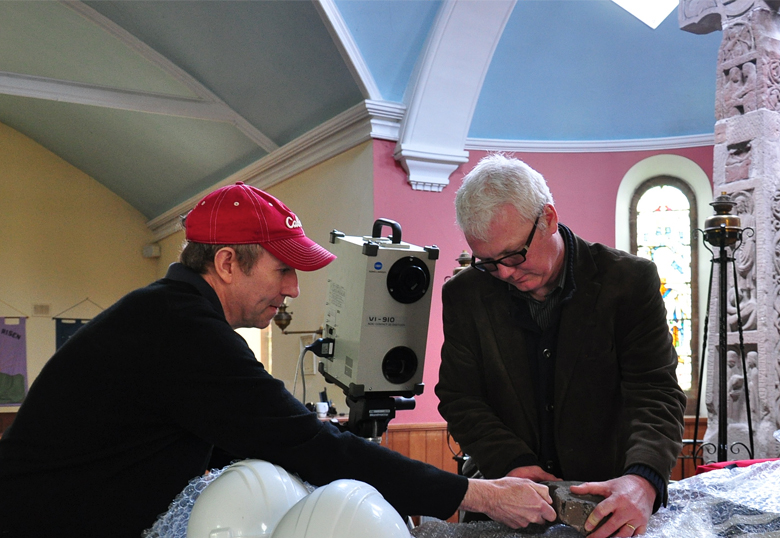Projects that involve the quest for new cancer-fighting drugs, the preservation of floodplain forests, and the creation of a digital library to support thousand-year-old crosses got a boost today with the Canada Foundation for Innovation’s John R. Evans Leaders Fund announcement.
The Honourable Ed Holder, Minister of State (Science and Technology), announced $30 million for research infrastructure in support of projects across the country, which is allowing scientists to expand their knowledge in aquaculture and other areas as diverse as architectural history and chronic pain. At the University of Lethbridge, more than $200,000 will go to three research projects.
Drs. Larry Flanagan and Stewart Rood, both biology professors, will receive more than $81,000 to establish an ecosystem-scale flux system to make long-term measurements of water vapour, carbon dioxide and methane fluxes in cottonwood riparian forests. The measurements will help them define how much river water is used by cottonwood trees in the extensive floodplain forests that line southern Alberta rivers. River waters are facing increased demands from a growing population, more economic development and for agricultural irrigation. Flanagan and Rood want to determine how much water needs to be left in southern Alberta rivers to sustain a healthy aquatic and riparian ecosystem.
“Proper management of river water resources is of fundamental importance to our citizens because most of Canada’s municipal areas are located along rivers. Effective management of river flows to allow removal of water for agricultural and industrial activities, while still leaving enough water to sustain our aquatic and riparian ecosystems is a high priority for all citizens,” says Flanagan.
Dr. Roy Golsteyn, a biochemistry professor and cancer researcher, will receive slightly more than $91,000 for laboratory infrastructure for his Prairie to Pharmacy research program dedicated to investigating the cancer-fighting properties of prairie plants such as the buffalo bean. The plant has shown promising signs of medicinal properties and, this summer, Golsteyn and his team identified six other prairie plants to investigate for anti-cancer effects.
“The award includes a new cancer cell imaging system that will watch hundreds of cells around the clock as they are treated with prairie plant extracts,” says Golsteyn. “It will be great for training students as they will have access to leading-edge equipment.”
Combined with gifts-in-kind from suppliers and a commitment from the province for matching funding, the award could total $250,000. Golsteyn says early support from the U of L allowed his lab to reach the level necessary to be selected for a national award. Now, the new equipment will help attract international research companies to work with Golsteyn and his team. Local donors, whether organizations or private individuals, who would like to help advance Golsteyn’s work are always welcome.
Dr. Daniel Paul O’Donnell, an English professor with expertise in Digital Humanities and Old and Middle English language and literature, will continue research on the Visionary Cross Project thanks to an infrastructure support award worth slightly more than $28,000. The award was the only one of its kind in Canada this year under the Canada Foundation for Innovation’s John R. Evans Leaders Fund (JELF) competition in association with the Social Sciences and Humanities Research Council (SSHRC). This is the third award the project has earned this year. O’Donnell has also been awarded a four-year, $233,000 Insight award from SSHRC and a one-year $9,000 allotment from the Graphics, Animation and New Media (GRAND) National Centre of Excellence.

“These funds will be used in the development of a digital library to support the cultural and textual heritage and multidisciplinary research on objects belonging to the Visionary Cross tradition in Anglo-Saxon England,” says O’Donnell.
The Visionary Cross Project focuses on the Ruthwell and Bewcastle stone crosses in Northern England and Scotland, the Brussels reliquary cross in Belgium, and the ‘Dream of the Rood’ and ‘Elene’ poems from the Anglo-Saxon Vercelli Book manuscript in Italy. These objects are all more than a thousand years old and are closely related to each other. The crosses have carved panels that depict scriptural scenes, and are bordered by inscriptions in Latin, Runic and Old English. These inscriptions have similar wording to that found in the Vercelli book.
Combining technology such as 3D modeling and gaming, the Visionary Cross Project will give scholars the chance to study these artifacts in a unique way and advance knowledge in the Digital Humanities and Anglo-Saxon studies. U of L professors Wendy Osborn and James Graham were co-applicants on the grants. Osborn will be responsible for developing the digital library, including metadata, cataloguing and organization of 2D and 3D data for user-centered retrieval. Graham is developing online and interactive virtual environments.The Visionary Cross team has been collecting digital representations of these objects over the last eight years.
“We would like to bring these diverse and informally catalogued collections together to form an organized, multimedia Digital Library accessible to all and able to be expanded in the future,” says O’Donnell.

